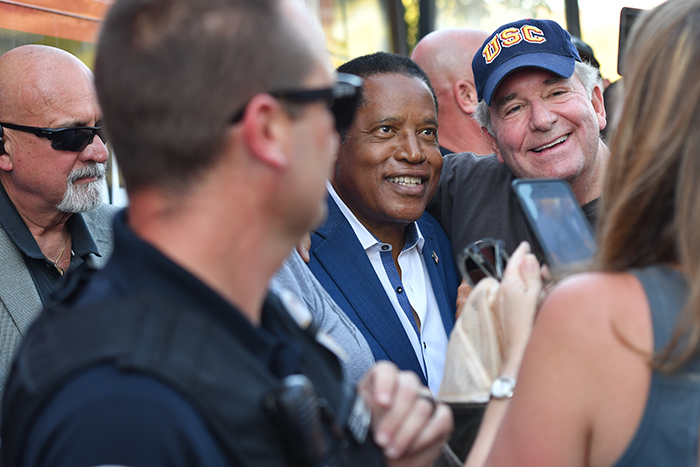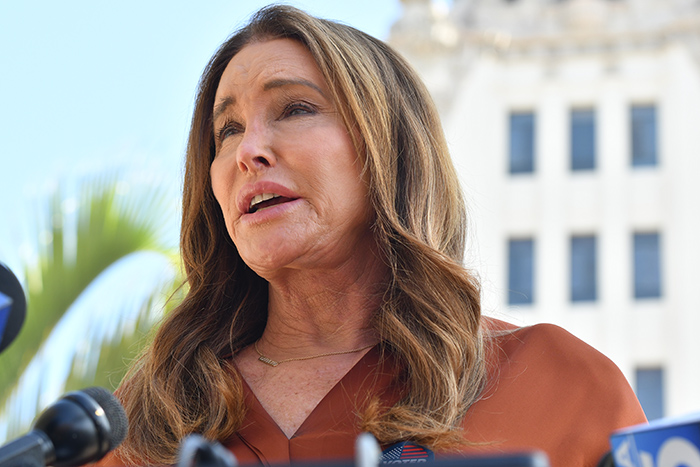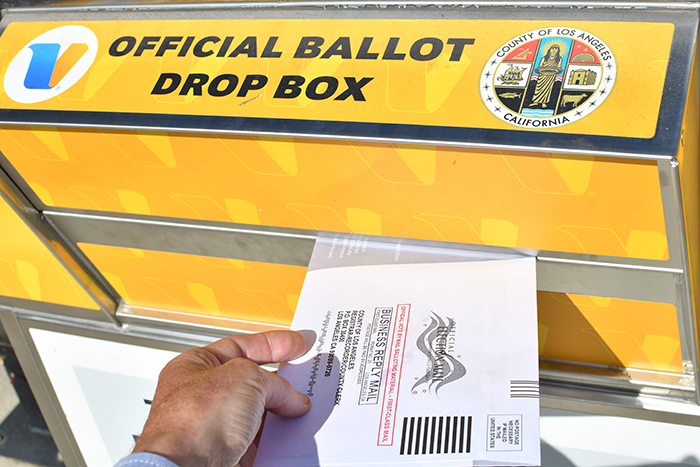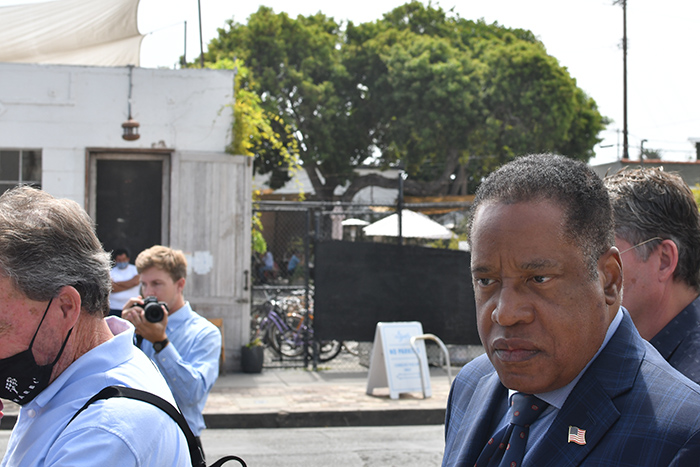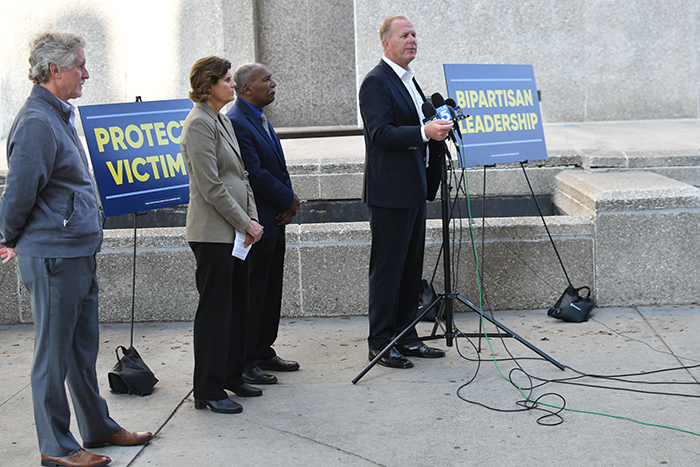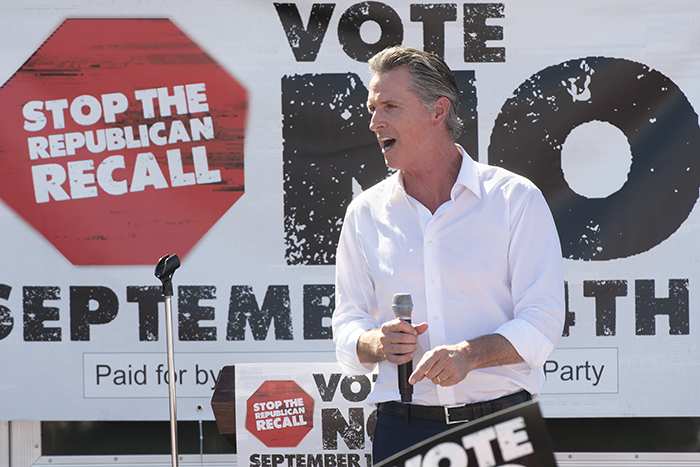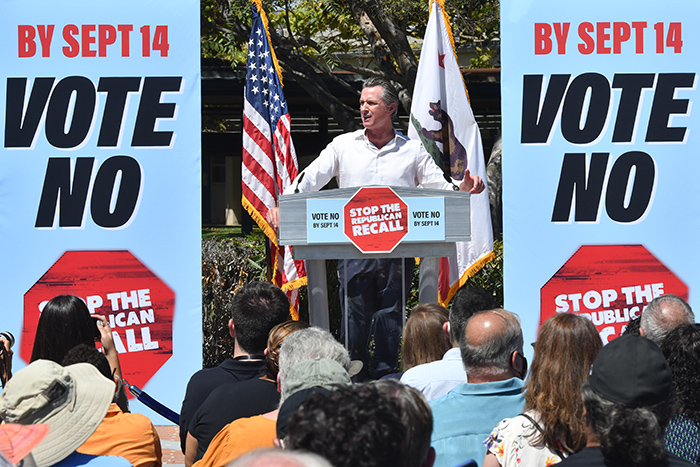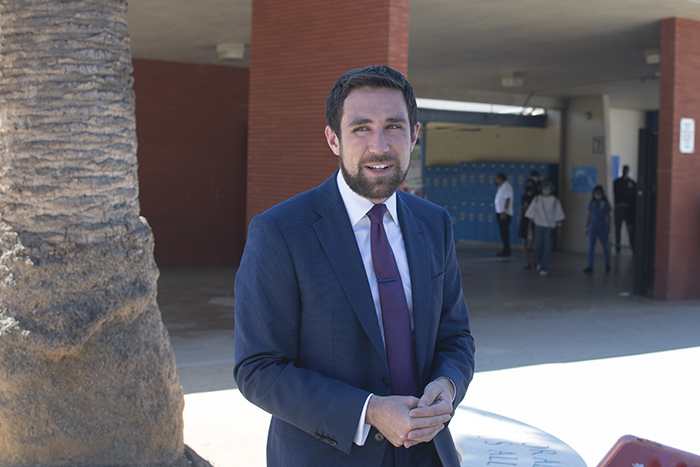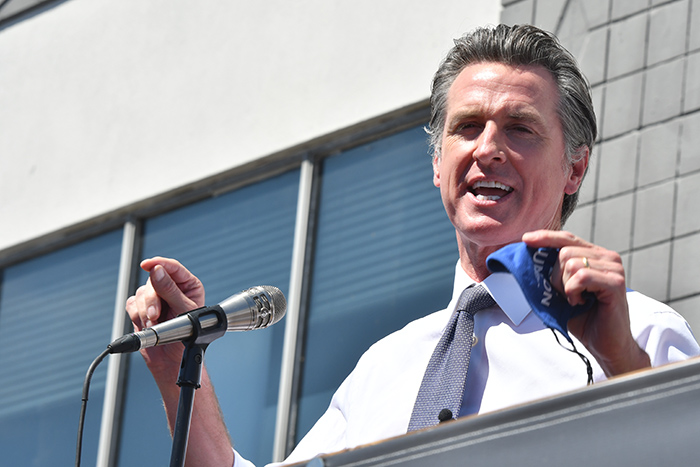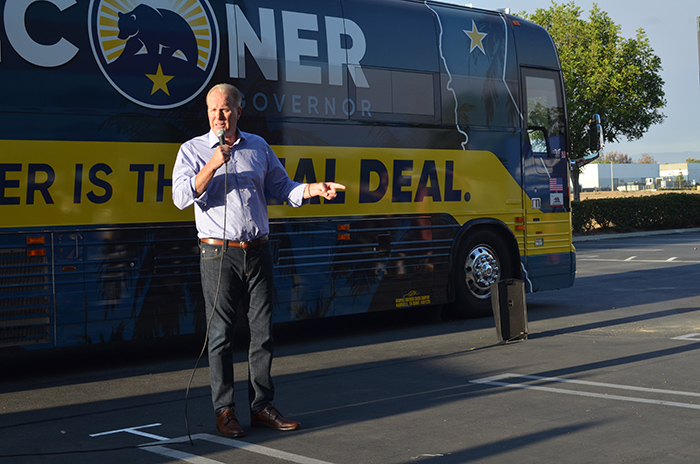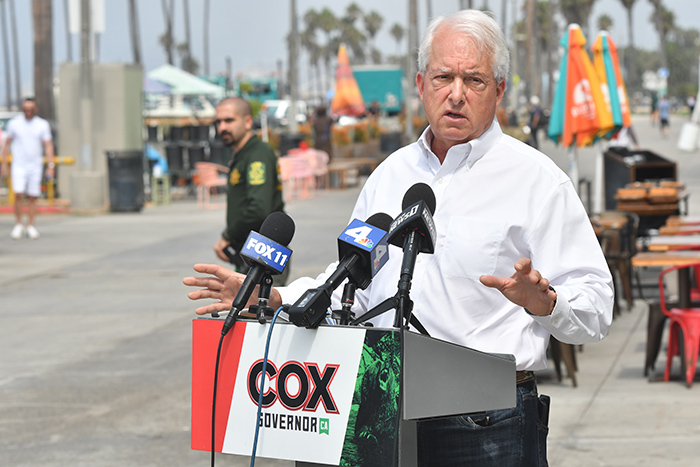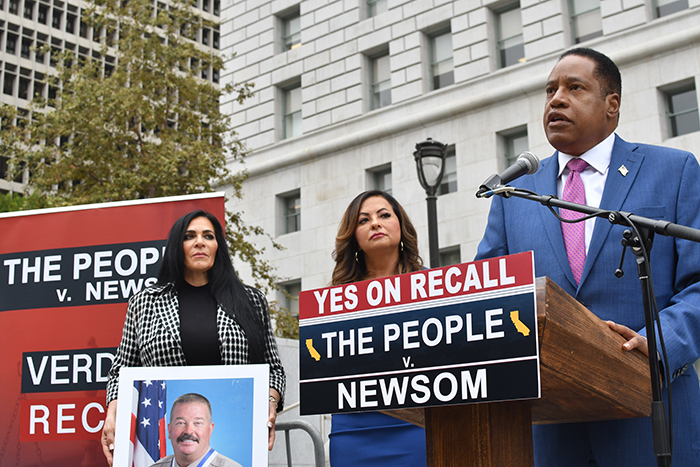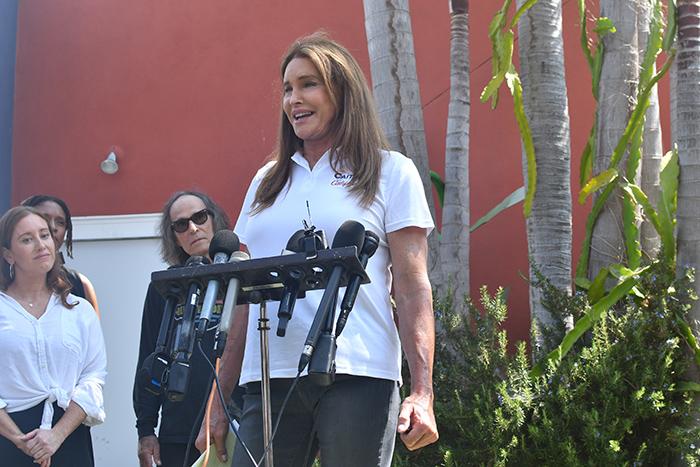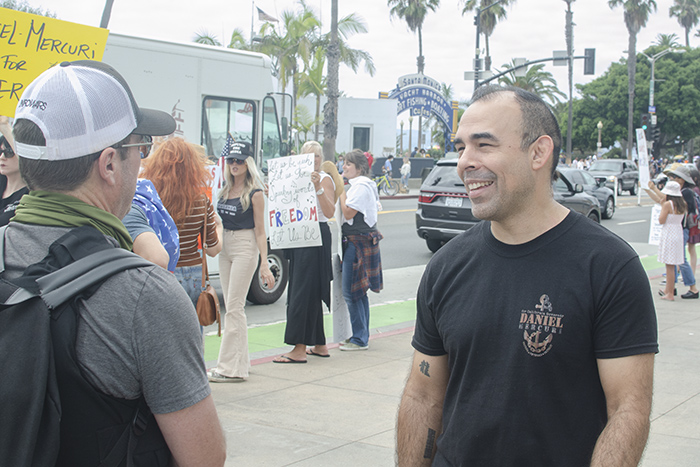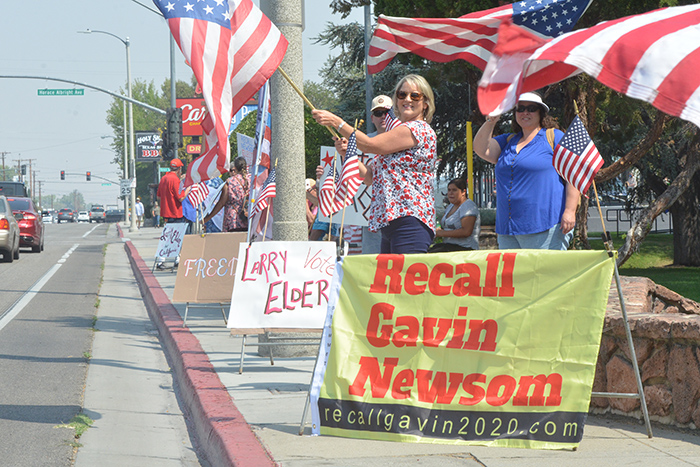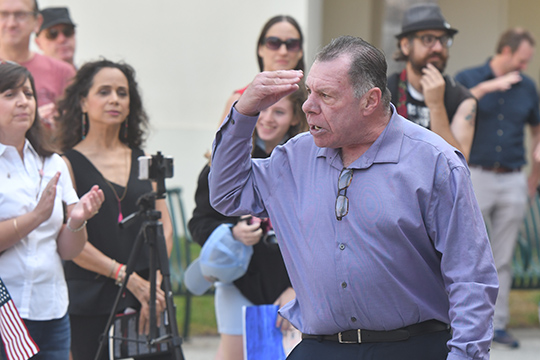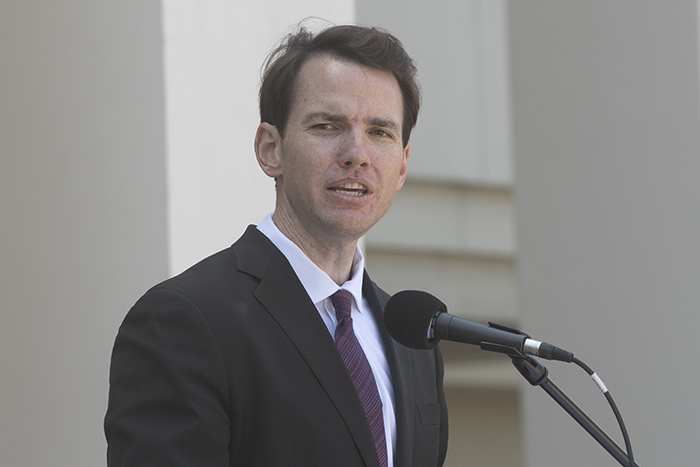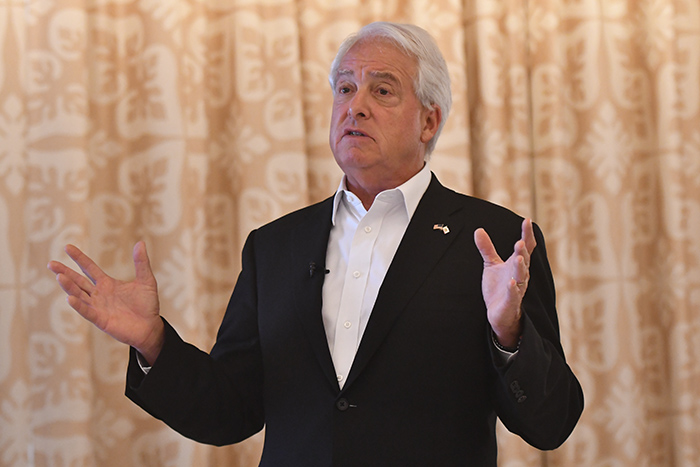The Recall Election: A Referendum on Gov. Gavin Newsom's
Leadership
Gov. Gavin Newsom secured a resounding win in the Sept. 14 recall election, strengthening his position as he looks ahead to his re-election campaign in 2022. Newsom needed to win more than 50% of the vote to remain as governor; if he had fallen below 50% the top vote-getter would have replaced him as the next governor. Newsom's win was not a surprise. Democrats enjoy a huge registration advantage in the Golden State; the Secretary of State's final report from Aug 30, 2021 showed 22,057,154 registered voters (out of 24,819,858 eligible); of these 10.3 million (46.54%) were registered Democratic, 5.3 million (24.02%) Republican, 5.1 million (23.15%) no party preference and the remainder (a bit more than 6%) other (>). Nevertheless, polls in early August did show the recall vote might be close (>), and the presence of forty-six candidates on the ballot seeking to replace Newsom made for an interesting campaign.
Gov. Gavin Newsom secured a resounding win in the Sept. 14 recall election, strengthening his position as he looks ahead to his re-election campaign in 2022. Newsom needed to win more than 50% of the vote to remain as governor; if he had fallen below 50% the top vote-getter would have replaced him as the next governor. Newsom's win was not a surprise. Democrats enjoy a huge registration advantage in the Golden State; the Secretary of State's final report from Aug 30, 2021 showed 22,057,154 registered voters (out of 24,819,858 eligible); of these 10.3 million (46.54%) were registered Democratic, 5.3 million (24.02%) Republican, 5.1 million (23.15%) no party preference and the remainder (a bit more than 6%) other (>). Nevertheless, polls in early August did show the recall vote might be close (>), and the presence of forty-six candidates on the ballot seeking to replace Newsom made for an interesting campaign.
See also: Campaign Literature, Websites,
Links
CASOS - Recall Election | Campaign Finance | Voter Guide | Results Q.1, Q.2
CASOS - Recall Election | Campaign Finance | Voter Guide | Results Q.1, Q.2
| by Eric M.
Appleman in Los Angeles, CA, updated Sept. 16,
2021 The Campaign The defining characteristic of the recall campaign was its brevity. The California Secretary of state released the certified list [contact list] [PDF] of 46 candidates—twenty-four Republicans, nine Democrats, ten no party preference, two Greens and a Libertarian—on July 21, and voters started receiving ballots in mid-August. [On July 17 the Secretary of State issued a notice [PDF] to candidates listing 41 candidates. On July 21 Sacramento County Superior Court Judge Laurie Earl ruled the requirement to produce tax records did not apply to the recall. Five candidate were added to make 46]. Some of the recall candidates were already running for 2022, and had been out on the trail for months, but others faced an extremely abbreviated period in which to reach voters. The recall election was not cheap; a July 1 estimate [PDF] by the California Department of Finance put the cost to state and local officials of administering the election at about $300 million. On top of that was the money raised and spent by supporters and opponents of the recall, which CalMatters put at $84.7 million as of Sept. 13, $70.9 million by recall opponents and $13.9 million by supporters (>). On Aug. 4 the Los Angeles Times reported that Newsom and his allies had raised more than $51 million. Newsom's and his supporters' central message to voters was a call to "stop the Republican recall." Newsom himself remained largely above the fray until the final month. On Aug. 13 he kicked off his first campaign tour of the recall race in San Francisco. In the closing couple of weeks he markedly stepped up his efforts, focusing much of his fire on leading Republican recall candidate Larry Elder. More broadly Newsom presented the race as part of a larger battle against "Trump and Trumpism." Unions played a pivotal role in opposing the recall (+). A California Labor Federation website argued the recall was "a sneak attack on our jobs, wages, benefits and union." The website declared, "The recall is funded by anti-union millionaires and special interests to roll back decades of progress on workers’ rights in California." SEIU California reported that a "coalition of labor and more than 90 community organizations powered the largest ground campaign since the landmark Yes on Prop 30/No on Prop 32 victories in 2012." Women's groups also played a key role (+). Newsom's campaign attracted support from national Democrats. On Aug. 12 President Joe Biden issued a statement in support of Newsom and tweeted, "Gov. @GavinNewsom is leading California through unprecedented crises—he's a key partner in fighting the pandemic and helping build our economy back better. To keep him on the job, registered voters should vote no on the recall election by 9/14 and keep California moving forward." Vice President Kamala Harris rallied with Newsom at a union training facility in San Leandro on Sept. 8. (Harris had been scheduled to do a car rally with Newsom at the Cow Palace in San Francisco on Aug. 27 but cancelled following events in Afghanistan). President Biden appeared with Newsom at a rally in Long Beach on Sept. 13 (>). Sens. Elizabeth Warren (MA) and Amy Klobuchar (MN) rallied with Newsom in Southern California. Also, a TV ad featuring former President Barack Obama urging voters to "protect California by voting 'No' on the Republican recall" started running on Sept. 8. By contrast national Republican leaders largely steered clear of the recall, although former President Trump made unsubstantiated charges of a rigged election. Conventional wisdom at the start of the campaign in July put a half dozen Republicans with some name recognition in the top tier: former San Diego Mayor Kevin Faulconer, 2018 Republican nominee John Cox, former U.S. Rep. Doug Ose, celebrity Caitlyn Jenner, talk radio host Larry Elder and Assemblyman Kevin Kiley. Jenner's candidacy was undercut when she went to Australia in July to film a reality show, which she said had committed to previously. Ose suffered a heart attack on the evening of Aug. 16; he announced the next day that he was ending his campaign to focus on rehabilitation and healing. Cox drew attention with his "Meet the Beast" bus tour in May, complete with a 1,000-pound Kodiak bear. He emphasized his experience as a businessman and CPA. Faulconer, who served as Mayor from Mar. 2014 to Dec. 2020, when he was term-limited, pointed to his ability to work across partisan lines. Kiley had authored a book, "Recall Newsom: The Case Against America's Most Corrupt Governor," but was not well known. Although Elder entered the race late, announcing on July 12, he benefited from high name recognition and Republicans' desire to unite behind someone who could win, and he was seen as the frontrunner among the recall candidates from the outset. By virtue of his career as a radio host and columnist, Elder had a well-honed, strong conservative message and provided sharp critiques of the politics of the left (+). He said for example that he would take on the public sector unions as Scott Walker had done in Wisconsin. He vowed to repeal mask mandates. Most controversially he argued that "racism is no longer a major problem in America." Democrats mined Elder's writings and portrayed him as a misogynist and far-right kook. A potentially significant point in the campaign was whether the California Republican Party would vote to endorse or not endorse a candidate [PDF]. Four candidates qualified by gathering nominations from at least 200 delegates in good standing: Ose, Kiley, Faulconer and Elder. At a virtual endorsement meeting held via Zoom on the morning of Aug. 7, delegates voted by 671 to 77 not to endorse a candidate. The forty-six recall candidates ran the gamut in terms of background, experience and ideology. The better-known candidates actively raised money, had staff and consultants, and maintained busy schedules full of events and media appearances. Most of the candidates were largely unknown. Some spent little beyond the filing fee and 25 cents per word for the candidate statement [background and qualifications] in the voter pamphlet. Some of these candidates were running not so much to become governor as to advance an issue or cause or for career exposure. As California is such a big state, candidates, particularly those with limited resources focused their in-person activities in their own regions, with occasional forays further afield. The recall candidates were affiliated with the major and minor parties as well as some smaller parties that were not officially recognized; the latter candidates were among those listed as no party preference. Although there were Democratic, other party and no party preference candidates running, the activity on the Republican side was particularly intense as two dozen GOP candidates were working to get their messages out. Republican candidates participated in virtual and in-person forums, some did rallies and bus tours. UNITE 911, a local group in the Coachella Valley, held an early forum in Cathedral City on July 22 that drew five candidates. Yes California, a PAC that supports independence for the state of California, has been organizing forums. The Sonoma County Republican Convention on Aug. 14 drew nine candidates plus three appearing by video. The Visalia Republican Women Federated held a candidates forum on Sept. 9 that drew 11 candidates. There were four broadcast debates in August, but missing from all of them were Newsom, who said he would not participate in any debates, and Elder and Jenner who said they would only debate Newsom. The Richard Nixon Foundation hosted the first debate at the Nixon Library in Yorba Linda on Aug. 4; four Republican candidates participated. A debate hosted by the Sacramento Press Club on Aug. 17 featured three top tier GOP candidates, and the Nexstar Media debate on Aug. 19 likewise featured three top tier Republican candidates. The Aug. 25 KCRA 3/SF Chronicle debate was the first to include a Democrat, Kevin Paffrath, and was the final debate. Top issues in the campaign included homelessness and housing affordability, taxes, crime and Newsom's response to the pandemic, particularly the effects on small businesses and schools. Generally conservatives pointed to what they said was executive overreach by Newsom, epitomized by the state of emergency. For example, the California Republican Party focused its attack on "King Newsom." The election occurred at a challenging time for California. The homeless situation was worse than it had ever been, with tent encampments along sidewalks in many urban areas. A Jan. 2020 federal report put the number of homeless in the state at more than 161,000 (>). With the appearance of the Delta variant of COVID-19, and the increase in cases, the pandemic was still very much on people's minds. Also on people's minds were water (>) and wildfires (>). Newsom proclaimed a drought emergency in Mendocino and Sonoma Counties on April 21, and he issued further proclamations on May 10 and July 8; the 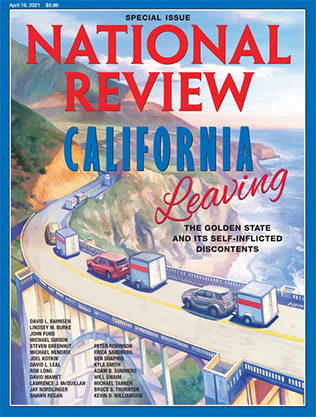 drought emergency now encompasses 50 of 58
counties. In August the Dixie Fire became the
largest single fire in California history. By
late August it had burned over three-quarters of a
million acres, and vast swathes of central
California were blanketed with smoke.
drought emergency now encompasses 50 of 58
counties. In August the Dixie Fire became the
largest single fire in California history. By
late August it had burned over three-quarters of a
million acres, and vast swathes of central
California were blanketed with smoke.In May 2021 the California Department of Finance reported that the state's population declined by 182,083 people in 2020, the first such decline since it started making the estimates. National Review magazine devoted its April 19, 2021 issue to the theme of "California Leaving: The Golden State and its Self-Inflicted Discontents." The Prologue In 2019 Gov. Gavin Newsom (D) was subject to several efforts to bring about a recall election, but proponents fell far short of obtaining the required number of petition signatures (>). On June 10, 2020 Orrin Heatlie, a retired sheriff from Folsom, launched another effort. The petition charged: "Governor Newsom has implemented laws which are detrimental to the citizens of this state and our way of life. Laws he endorsed favor foreign nationals, in our country illegally, over that of our own citizens. People in this state suffer the highest taxes in the nation, the highest homelessness rates, and the lowest quality of life as a result. He has imposed sanctuary state status and fails to enforce immigration laws. He unilaterally over-ruled the will of the people regarding the death penalty. He seeks to impose additional burdens on our state by the following; removing the protections of Proposition 13, rationing our water use, increasing taxes and restricting parental rights. Having no other recourse, we the people have come together to take this action, remedy these misdeeds and prevent further injustices." Newsom responded: "This unwarranted recall effort will cost California taxpayers 81 million dollars. It is being pushed by political extremists supporting President Trump's hateful attacks on California [PDF]." Recall proponents needed to collect 1,495,709 signatures—12% of the last vote for the office—by Nov. 17, 2020 (in 160 days) to force a recall election. The effort appeared headed for failure, but on Nov. 6 a judge in Sacramento extended the deadline to Mar. 17, 2021 due to the pandemic. Meanwhile, as first reported by FOX 11 Los Angeles, Newsom made an unforced error and gave a boost to his critics, when on Nov. 6 he appeared at a dinner at the exclusive French Laundry restaurant in Napa Valley despite COVID-19 restrictions. On Apr. 26, 2021 Secretary of State Dr. Shirley N. Weber announced the recall threshold had been met, and final signature verification followed on Apr. 29. However, the law provided that voters could withdraw their signatures within 30 business days. On June 23, the Secretary of State reported that even accounting for withdrawn signatures, the petition met the threshold. On July 1, Lt. Gov. Eleni Kounalakis set the date of the election as Sept. 14. The filing deadline was July 16. Replacement candidates faced a relatively low threshold to get on the ballot: a) file declaration of candidacy and nomination papers with 65 to 100 valid nomination signatures from their home county; b) pay filing fee of $4,194.94 or submit a minimum of 7,000 valid signatures; and c) submit to the Secretary of State every income tax return filed over the last five years. According to the Secretary of State, before this recall there were 55 attempted recalls of California governors over the years. Only one, that of Gray Davis in 2003, succeeded. Davis had been re-elected in 2002 with just 47.3% of the vote. The Oct. 7, 2003 recall election proved to be a zoo when 135 candidates qualified (>). A majority of voters voted to recall Davis, and the replacement candidate with the most votes, Arnold Schwarzenegger, was thereby elected. Only four candidates including Schwarzenegger obtained more than 1-percent of the vote. Results: The Numbers Tell the Story [REACTIONS] In the 2021 recall Democrats appeared to be in a very strong position. Democrats enjoy a huge registration advantage; the Secretary of State's final report from Aug 30, 2021 showed 22,057,154 registered voters (out of 24,819,858 eligible). Of these, 10.3 million (46.54%) were registered Democrat, 5.3 million (24.02%) Republican, 5.1 million (23.15%) no party preference and the remainder (a bit more than 6%) other (>). Newsom had won election in 2018 with 61.95% of the vote and in 2020 Biden tallied 63.48% of the vote in the Golden State. Unofficial results from election night (2:35 a.m. on Sept. 15) showed "No" with 5,840,283 votes (63.9%) and "Yes" with 3,297,145 (36.1%). "No" was ahead in 31 counties including the Southern quarter of the state and all of the coastal counties except the northernmost Del Norte; "Yes" was ahead in 27 interior counties. On Question 2, Larry Elder was the only candidate to achieve double digits with 46.9% of the vote. Thirty-three candidates obtained less than 1%. One seeming anomaly in the results is the relatively strong showing of unknown Democratic candidate Brandon Ross . Ross said, "I did not produce any literature or advertise in any way. All I did was sit for media interviews to tell my story and platform." Another one of the candidates said that Ross had benefited from a very strong candidate statement in the voter's pamphlet.
The results raise several questions. Given their poor showings in the recall election, will Republicans be able to mount a serious challenge to Newsom in 2022, when he is up for re-election? Will any of the major Republican recall candidates continue their campaigns into 2022 or will a new contender emerge? And, given the cost of the recall and the proliferation of local recallls around the state, will efforts to change the recall process gain momentum? revised Sept. 16, 2021 _____________ Managers for the Top Campaigns Gavin Newsom: Juan Rodriguez @LAJRod Partner at Bearstar Strategies (previously SCRB Strategies and earlier SCN Strategies) from Jan. 2017. Campaign manager on Kamala Harris for the People presidential campaign, Jan.-Dec. 2019. Campaign manager on Harris' 2016 campaign for U.S. Senate from Nov. 2015. Senior advisor in the Office of Attorney General Harris, 2013-15. Director of state relations for Los Angeles Mayor Antonio Villaraigosa, 2009-13. M.B.A. from Pepperdine University; B.A. in political science from UCLA. John Cox: Byran Reed @BryanReedGOP Client services director at FlexPoint Media, Apr.-Nov. 2020. Campaign manager on Eddie Rispone for Governor (LA), Dec. 2018-Dec. 2019. Campaign manager on Knute Buehler for governor (OR). Campaign manager on Todd Rokita's campaign for Republican nomination for U.S. Senate (IN), 2017-18. Campaign manager, briefly, on Jim Renacci's campaign for governor (OH), Mar.-Apr. 2017. Campaign manager on Eric Greitens for governor (MO). Deputy national political director on Rand Paul for President, 2015-16. Government affairs manager in the Office of Gov. Bruce Rauner, Jan.-Mar. 2015. Field director on Citizens for Rauner, June 2013-Nov. 2014; field director on the Bruce Rauner Exploratory Committee. Legislative aide to U.S. Rep. Robert Dold (IL), Nov. 2012-Jan. 2013. Political director on Dold for Congress, March-Nov. 2012. District representative (Dec. 2011-Feb. 2012) and constituent caseworker (Jan.-Dec. 2011) to U.S. Rep. Robert Dold (IL). Field coordinator on Dold for Congress, July 2010-Jan. 2011. Bachelor's degree in political science and government from University of Iowa, 2009. Kevin Faulconer: Stephen Puetz @stephenpuetz Senior vice president at Axiom Strategies in San Diego since July 2017. Chief of staff to Mayor Kevin Faulconer, Mar. 2014-July 2017. Campaign manager on Kevin Faulconer for Mayor, Sept. 2013-Feb. 2014. Chief of staff to Councilman Faulconer, Dec. 2012-Sept. 2013. Vice president at Revolvis Consulting, Jan. 2011-Dec. 2012. Associate at Axiom Strategies, Aug. 2010-Jan. 2011. Campaign manager on John Oxendine for Governor (GA), Mar.-Aug. 2010. Political director on Tom Foley for Governor (CT), Sept. 2009-Mar. 2010. Council rep. for Councilman Faulconer, Jan.-Sept. 2009. Senior associate at Coronado Communications, Feb. 2008-Jan. 2009. California field director on Romney for President. Sept. 2007-Feb. 2008. District director for Calif. Assemblyman Martin Garrick, Dec. 2006-Oct. 2007. Campaign manager on Shirley Horton for Assembly 2006, June-Nov. 2006. Campaign manager on Martin Garrick for Assembly, Jan.-June 2006. Republican Party of San Diego County, Nov. 2005-Jan. 2006. California state chairman of CRNC, 2005-06. Field rep. for Calif. Assemblyman Mark Wyland, Jan.-Nov. 2005. B.S. in business finance from Cal State San Marcos, 2004. Larry Elder: Jeffrey Corless @JeffCorless (from Aug. 20...succeeded Louis Barnett (July-Aug.) President and CEO of Venture Strategic Inc. in Orange County from July 2011. Director of unnamed statewide organization, July 2010-July 2011. Deputy campaign manager/political director on Carly Fiorina for U.S. Senate, Jan.-Nov. 2010. Chief of Staff to Calif. Assemblywoman Diane Harkey, Dec. 2008-June 2010. Chief deputy to Orange County Supervisor Pat Bates, Jan. 2007-Dec. 2008. Deputy coalitions director on Schwarzenegger 2006 re-election/Victory '06, June-Dec. 2006. M.B.A. from Chapman University, 2007; B.B.A. in business administration and economics from Loyola Marymount University, College of Business Administration, 2003. Caitlyn Jenner: Stephen Cheung, Michelle Meadows and Christina Perron Kevin Kiley: Jake Fischer @jakefischerca (July 2021) Associate (Feb. 2020-July 2021) and summer associate (June 2019-Feb. 2020) at Boston Consulting Group (BCG). District office intern to Assemblyman Kiley, June-Aug. 2017. Emergency care sergeant in the U.S. Army, Oct. 2012-Aug. 2016. B.A. in global affairs from Yale University, 2020; associate's degree in political science and government from Sierra College, 2017. |
 Sept. 9 - Visalia Republican Women Federated candidates forum at Visalia Country Club. .
. . . .
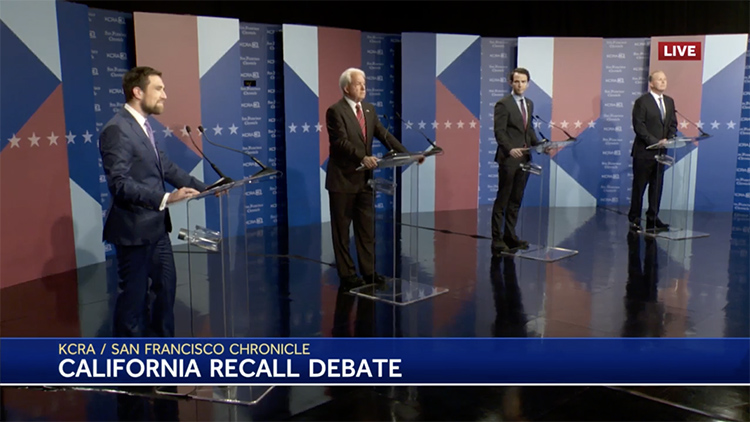 [screen grab from KCRA 3] Aug. 25 at 7:00 p.m. - KCRA 3/San Francisco Chronicle Debate in Sacramento (+). COX, FAULCONER, KILEY, PAFFRATH . . .
. .
COX, . . . . .
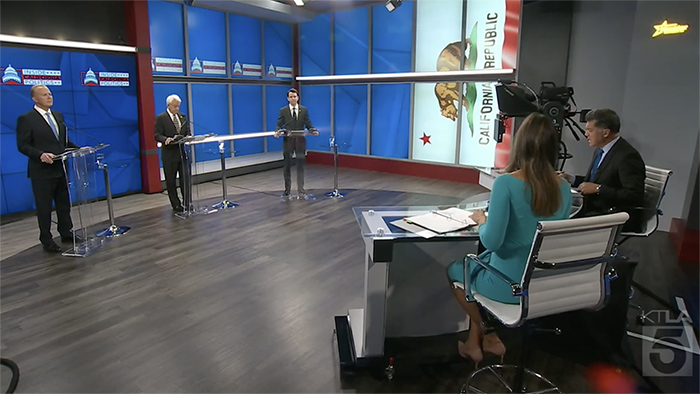 [screen grab from Nexstar Media Inc., Inside California Politics] Aug. 19 at 7:00 p.m. - Inside California Politics (Nexstar Media) Debate at KRON4 studios in San Francisco (+). COX, FAULCONER, KILEY . . . . .
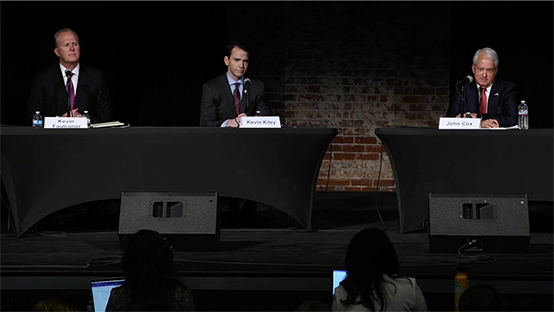 [screen grab from Sacramento Bee video] Aug. 17 at 6:00 p.m. - Sacramento Press Club, CapRadio and The Sacramento Bee Debate at Guild Theater in Sacramento (+). COX, FAULCONER, KILEY, . . . . .
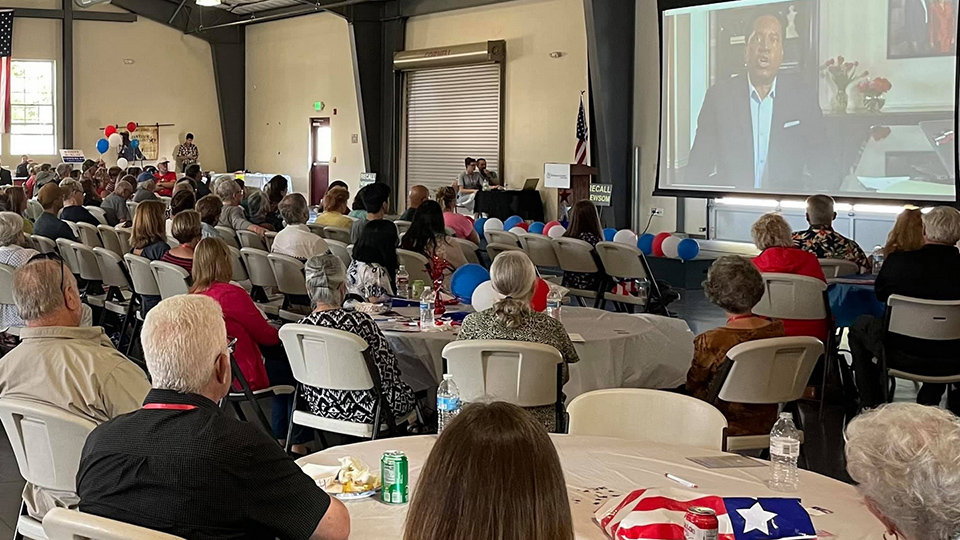 [Sonoma County GOP photo] Aug. 14 at 3:00-7:00 p.m. - Sonoma County Republican Convention at Sonoma County Fairgrounds in Santa Rosa (+). . . . . .
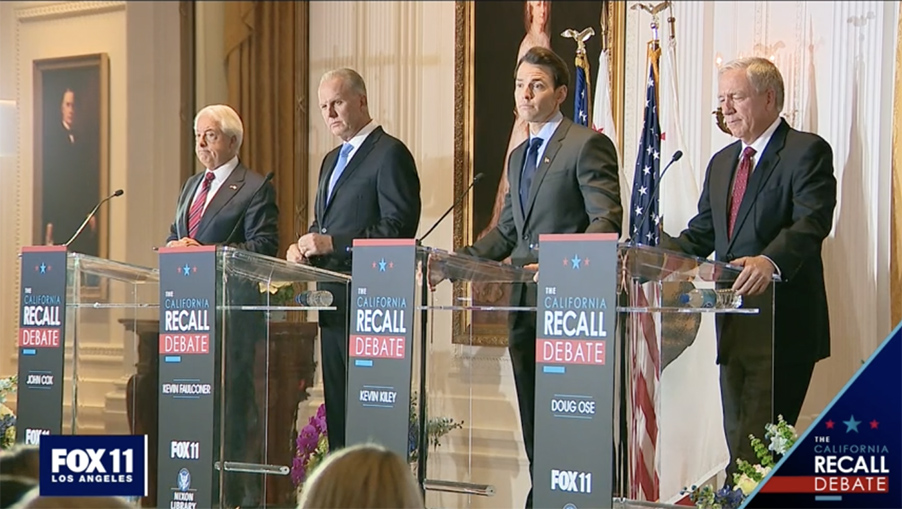 [screen grab from FOX 11] Aug. 4 - Richard Nixon Foundation/FOX11 Debate at the Nixon Library in Yorba Linda (+). COX, FAULCONER, KILEY, OSE |
ADVERTISEMENT

